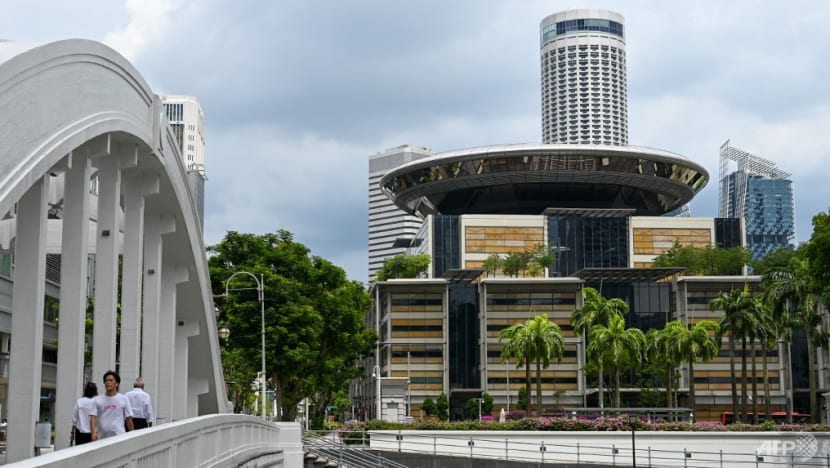Court of Appeal acquits man on death row accused of trafficking 1.8kg of cannabis

People walk across a bridge near the Supreme Court in Singapore on Nov 9, 2021. (Photo: AFP/Roslan Rahman)
SINGAPORE: The Court of Appeal on Friday (May 27) overturned the conviction of a man on death row accused of trafficking more than 1.8kg of cannabis, after finding that it was a case of mistaken delivery.
Raj Kumar Aiyachami, 40, was convicted in 2020 of possessing the Class A controlled drug for the purpose of trafficking, which carries a mandatory death sentence.
The Court of Appeal also acquitted a second man involved in the case, Ramadass Punnusamy, 41, who was previously sentenced to life imprisonment and 15 strokes of the cane after being found guilty as a drug courier.
Both men were nabbed on Sep 21, 2015, when Ramadass, a lorry driver for a transport company in Johor Bahru, drove into Singapore and delivered a red plastic bag to Raj at Senoko Drive.
Central Narcotics Bureau officers knew the delivery would be taking place that day, and arrested both men shortly after. At trial, Raj and Ramadass did not dispute that they were in possession of the drugs.
Delivering the court's judgment, Chief Justice Sundaresh Menon said that both men's appeals turned solely on whether they had actual or presumed knowledge of the nature of the drugs found.
The court ruled in favour of Raj's defence that he had ordered chemically-sprayed tobacco, known as "Butterfly", and that the cannabis was delivered to him by mistake.
It found that the trial judge erred in rejecting the testimony of Mark Kalaivanan Tamilarasan, a man Raj first met in prison between November 2017 and January 2018.
During one conversation in the prison yard, after learning the circumstances of Raj's arrest, Mark told Raj that he was also at Senoko Loop on Sep 21, 2015 to collect "ganja", the street name for cannabis, but ended up receiving "Butterfly" instead.
Raj told Mark to inform his lawyers Anand George, Ramesh Tiwary and Sankar Kailasa Thevar Saminathan of this, and Mark subsequently gave his evidence in court.
Mark testified that he remembered the transaction took place on Sep 21, 2015 because his pet hamster died that evening and he got a tattoo with the date.
The trial judge rejected Mark's testimony after finding that there was "ample opportunity" for him and Raj to "collude and manufacture the story".
However, Chief Justice Menon said that without a specific finding of actual collusion, Mark's evidence should not have been rejected.
"There is an immense difference between having the opportunity to do something and actually doing that thing," said the court.
The court also noted that by giving his evidence, Mark was implicating himself in a very serious offence that he had not been charged with or investigated for.
"The fact that Mark had effectively confessed to having at least attempted to commit a serious offence is a weighty factor in evaluating his evidence," the judges said.
The Court of Appeal also disagreed with the trial judge's finding that Raj must have known he was in possession of cannabis because of the smell emanating from the package.
The appeal by Ramadass, represented by Ms N K Anitha, Mr Eugene Thuraisingam and Mr Johannes Hadi, contested the reliability of statements that he gave to police on the day of his arrest.
The prosecution had argued that Ramadass admitted to actual knowledge of the nature of the drugs in these statements.
The Court of Appeal found that numerous discrepancies and inconsistencies regarding the words that Ramadass used in the statements, as well as the times they were recorded at, made them unsafe to rely on.
"Where the case against an accused person turns on the specific words that are reflected in a statement, as is the case here, it is critically important that the court be satisfied as to the accuracy of the statement," said the court.
The court also noted that Ramadass consistently maintained that he believed he was bringing in chemically-sprayed tobacco, and found that he successfully rebutted the presumption of knowledge of the nature of the drugs.
The appeals were heard by a panel of three judges comprising Chief Justice Menon, Justice Andrew Phang and Justice Belinda Ang.
CNA has asked the Attorney-General's Chambers for more information, including what will happen to the men following their acquittal.














